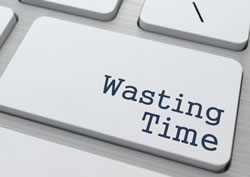Laura Stack says that too often otherwise productive people unconsciously get bogged down in the minutiae of the workplace. She suggests ways to identify if you are one of them, and if so, how to fix it.
 What is productive work? Simple: Work that helps you reach your goals.
What is productive work? Simple: Work that helps you reach your goals.
Sometimes, you may wonder if your work is really making a difference.
Perhaps minor tasks have overtaken your focus.
Perhaps you’re procrastinating. Perhaps you’re living in your inbox.
A recent poll of 1,987 United Kingdom workers revealed they did productive work for about 2.5 hours a day on average.
RescueTime’s study of 225 million hours of worktime in 2017 produced the same figure for users worldwide.
Most of rest of the day was wasted with busywork and other unproductive activities.
How can you tell if you’re gunning for the global average for productive work? Look for these six key indicators.
Your to-do list is glutted:
Having a long to-do list doesn’t mean you’re productive.
It may mean the opposite.
Todoist.com, for example, gives you the option of marking to-do tasks with red, orange, yellow, or white circles by order of priority.
A red circle indicates high priority work.
How many of your tasks fall in red-circle territory? If it’s more than three, you’re in trouble.
If your task list is longer than 10-to-12 significant items, ditto. Take a critical look at it. What matters most?
Focus on that and lower the priority of the rest as much as possible.
Do high priority tasks first or during high-energy times of the day.
Otherwise, you may make poor decisions about your time, and default to the easiest job left on your list.
You’re biting off more than you can chew:
If everything really is high priority, delegate what you can, triage your list mercilessly, and stop taking on more work.
If people keep shovelling it on your plate, let them know you can’t handle more.
There’s no passion in your work:
You don’t like it much, so you do just enough to get by.
You might even be a little productive, but you’re really just killing time.
Routines can help take up the slack, but if you’re always running on automatic, at some point you’re going to drift off into the weeds.
You may end up spending more time preparing for work than actually doing it.
You don’t do your best work, so your productivity drops.
If this is true, find ways to motivate yourself, if only by mental effort.
Find some aspect of your work you enjoy, and learn to love it.
Spread the love to other parts of your work.
This is tough, so award yourself regularly — with coffee, snacks, or an extra quick break — for accomplishing productive tasks.
Think about how doing a good job could translate into promotions.
You don’t know why you do things the way you do:
Someone told you to do it this way.
You’re just following the rules and procedures. You have no idea why.
Why use this report template? Why constantly recycle the same code modules?
Why send people the same report every week, when it would be as effective to send it every month? Does anyone even read it? Find out.
If you stopped doing a particular task, what would happen? Would someone scream, or would anyone even notice?
Someone has to do it:
Yes, there’s always low-value work someone has to do, but should you spend hours filing, printing, copying, or straightening up your cubicle?
There’s a work hierarchy for a reason.
If you’re a highly-paid professional, leave lower-value work for interns, support people, and/or entry-level professionals for whom the work is important.
You often pretend to feel, look, and act busy:
Enough said.
Whatever your reason — boredom, lack of passion, insufficient work, hating your job, or laziness — start focusing on strategic work.
The same methods for kindling passion will work here.
If you simply can’t stand what you’re doing, it’s time to find work you like more.
No one’s uber-productive every day, but your job shouldn’t be an exercise in futility.
What would you rather be: An underutilised placeholder or a productivity powerhouse?
*Laura Stack is a keynote speaker, author and authority on productivity and performance. She has authored seven books, including her newest work, Doing the Right Things Right: How the Effective Executive Spends Time . She can be contacted at theproductivitypro.com.
This article first appeared on Laura’s blogsite.











